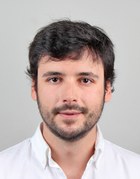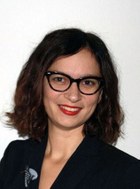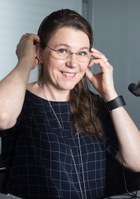faculty

Sijia CHEN
Southwest University
Sijia CHEN works at the College of International Studies at Southwest University (China) and she is also an Honorary Research Fellow at Macquarie University (Australia). She got her PhD in Linguistics at Macquarie University, where she worked as a research associate, tutor, and guest lecturer in the Department of Linguistics while she was studying for her degree. She teaches translation, interpreting, and audiovisual translation courses at Southwest University. Her main research interests include cognitive translation and interpreting (T&I) studies, T&I technology, and audiovisual translation. She investigates the cognitive processing and cognitive load in translation and interpreting using pen recording, eye tracking, think-aloud protocols, and psychometrics. Her current project focuses on computer-assisted interpreting (CAI) featuring speech recognition and machine translation.

Maureen EHRENSBERGER-DOW
ZHAW Institute of Translation and Interpreting
Maureen EHRENSBERGER-DOW is Professor of Translation Studies in the ZHAW Institute of Translation and Interpreting. She completed a PhD in experimental linguistics at the University of Alberta (Canada) before becoming involved in translation studies in Switzerland. Her main research interests are multilingual text production and translation processes, professional translation workplaces, and cognitive ergonomics. She was principal investigator of the interdisciplinary project Cognitive and Physical Ergonomics of Translation, a follow-up of the Capturing Translation Processes project, and is currently co-investigator of Cognitive Load in Interpreting and Translation (all funded by the Swiss National Science Foundation). She serves on the board of the European Society of Translation Studies (EST) and is a member of the TREC network.

Serena GHISELLI
Università di Bologna
Serena GHISELLI is a post-doc researcher at the Department of Interpreting and Translation (DIT) of the University of Bologna and a member of the Laboratory for Multilectal Mediated Communication & Cognition (MC2 Lab). She got her degree in conference interpreting (2015) at DIT, University of Bologna and her PhD in Translation, Interpreting and Intercultural Studies at the same University. Her research interests are interpreting studies and psychometrics, with a focus on the measurement of cognitive processes in interpreting (working memory, selective attention and split attention). She is a freelance interpreter and translator and taught several English language courses at university level.

Sandra L. HALVERSON
Agder University
Sandra L. HALVERSON is currently employed at Agder University in Norway. Her research has centered on questions related to various areas of Translation Studies and Cognitive Linguistics, and she has published both empirical and theoretical/conceptual work. An overarching concern is the integration of insights from Cognitive Linguistics into Translation Studies, and she is currently working on hypotheses linking translational choices to specifics of cognitive representation and processing. Other long-term research interests are the epistemology of Translation Studies and research methodology. Halverson served as co-editor of Target for a period of eight years and currently serves on the editorial boards of several TIS journals . She was appointed CETRA Chair Professor for 2018 and has held plenary lectures and other invited talks in numerous universities across Europe and in China. Halverson is an external associate of the MC2 Lab and a member of the TREC network.

Alexis HERVAIS-ADELMAN
University of Zurich
Alexis HERVAIS-ADELMAN graduated from the University of Cambridge with a degree in Natural Sciences, and stayed on to undertake a PhD in cognitive neuroscience at the Medical Research Council Cognition and Brain Sciences Unit. His research focused on the perception of degraded speech, and how top-down mechanisms help us to restore intelligibility to acoustically challenging signals. He then moved to the University of Geneva where he spent several years investigating the neural basis of simultaneous interpreting. After moving to the Max Planck Institute for Psycholinguistics in Nijmegen, Hervais-Adelman developed an interest in the neural basis of literacy. He now heads a Neurolinguistics group at the University of Zurich where, alongside ongoing research into multilingualism, literacy and the impact of language on cognition, he investigates potential neurofeedback and brain stimulation interventions to alleviate the impact of hearing impairment on speech comprehension.

Álvaro MARÍN
Universidad de Valladolid
Álvaro MARÍN is an assistant professor at the University of Valladolid (Spain). He has worked as a translation lecturer at the University of Essex (UK) and taught translation theory and practice at Kent State University (USA), where he completed his PhD in Translation Studies. His research interests are in the epistemology of Cognitive Translation Studies, the development of cognitive models of language mediation and in the history of ideas as related to translation and interpreting. He is currently investigating new forms of theory development from a pluralistic methodology. Álvaro Marín is an external associate of the MC2 Lab and a member of the TREC network.

Christopher D. MELLINGER
University of North Carolina at Charlotte
Christopher D. MELLINGER works at the University of North Carolina at Charlotte (USA) where he teaches translation and interpreting at the graduate and undergraduate levels. His research focuses on translation and interpreting process research, translation and interpreting technologies, and research methods. He is the managing editor of the journal Translation and Interpreting Studies, co-author of Quantitative Research Methods in Translation and Interpreting Studies, co-editor of Translating Texts: An Introductory Coursebook on Translation and Text Formation, and co-editor of special issues on community interpreting, translation, and technology, legal translation and interpreting as well as translation process research. Mellinger is a member of the TREC network.

Ricardo MUÑOZ MARTÍN
Università di Bologna
Ricardo MUÑOZ MARTÍN works at the Department of Interpreting & Translation of the University of Bologna, where he leads the Laboratory for Multilectal Mediated Communication & Cognition (MC2 Lab). He and his colleagues from the now extinct PETRA Research group set the foundations of cognitive translatology, a 4EA cognition framework within Cognitive Translation Studies (CTS). Now, Muñoz and his colleagues at the MC2 Lab work on several lines related to metacognition, attention, and cognitive effort and resource management in several mediation tasks. Muñoz has trained translators, mainly on scientific and literary translation, in several universities in Spain and the USA for more than 25 years, and lectured on CTS topics in many institutions in China, Europe, and the Americas. He is the editor of the journal Translation, Cognition & Behavior, and a member of the TREC network. Muñoz is also the director of the Summer School.

Christian OLALLA-SOLER
Università di Bologna
Christian OLALLA-SOLER works as a post-doc researcher at the Department of Interpreting and Translation of the University of Bologna, where he is a member of the Laboratory for Multilectal Mediated Communication & Cognition (MC2 Lab). He completed a PhD in Translation and Intercultural Studies at the Universitat Autònoma de Barcelona, Spain. His main research interests are translation and cognition and bibliometrics. Olalla-Soler has taught several courses on translation and interpreting theories, specialised translation, and terminology. He is a member of the TREC network. He is also a member of the European Society for Translation Studies and the Iberian Association for Translation and Interpreting Studies.

Nicoletta SPINOLO
Università di Bologna
Nicoletta SPINOLO is a research fellow at the Department of Interpreting and Translation (DIT) of the University of Bologna (Forlì), where she is a member of the Laboratory for Multilectal Mediated Communication and Cognition (MC2Lab). She got her degree in conference interpreting (2008) at SSLMIT, University of Bologna and her PhD in Translation, Interpreting and Intercultural Studies at the same University. Her research interests focus on interpreting studies and, more specifically, on interpreting between Italian and Spanish, on the management of figurative language in interpreting, on technologies and methods for remote interpreting and on cognitive processes in remote interpreting.

Elisabet TISELIUS
Stockholm University
Elisabet TISELIUS teaches public service, conference and signed language interpreting and supervises BA, MA and PhD students at the Institute for Interpreting and Translation Studies (TÖI) of Stockholm University in Sweden. Her research focuses on cognitive processes of simultaneous and dialogue interpreters, but also on the distress and emotional challenges in medical interpreting. Her research on cognitive aspects of dialogue interpreting is funded by the Swedish research council (VR grant 2016-01118). Her publications include several works on methodological and ethical aspects of research. Tiselius leads the research group Stockholm Process Research in Interpreting and Translation (SPRINT), which focuses on cognitive aspects of interpreting and translation. She is an affiliated researcher to Karolinska Institutet and Western Norway University of Applied Sciences, an external associate of the MC2 Lab, and a member of the TREC network. Tiselius tweets @tulkur

Bogusława WHYATT
Adam Mickiewicz University
Bogusława WHYATT works at the Faculty of English of Adam Mickiewicz University in Poznan, Poland, where she serves as head of the PhD studies, and the head of Department of Psycholinguistic Studies. With a background in psycholinguistics, her research interests focus on cognitive translation process and expertise development. Whyatt was the principal investigator in two large scale TPR projects funded by the National Science Centre Poland—the ParaTrans project (2013-2016) investigated similarities and differences between inter- and intralingual translation, and the EDiT project (2016-2019) focused on the effects of directionality in the translation process and in the end product. She has contributed chapters published by John Benjamins and Wiley Blackwell. Her most recent publications include articles in Translation Cognition & Behavior (2019) and in The Interpreter and Translator Trainer (2019). She runs MA seminars in translation studies, supervises PhD dissertations, and is an experienced translator trainer and a freelance translator. Whyatt is a member of the TREC network.